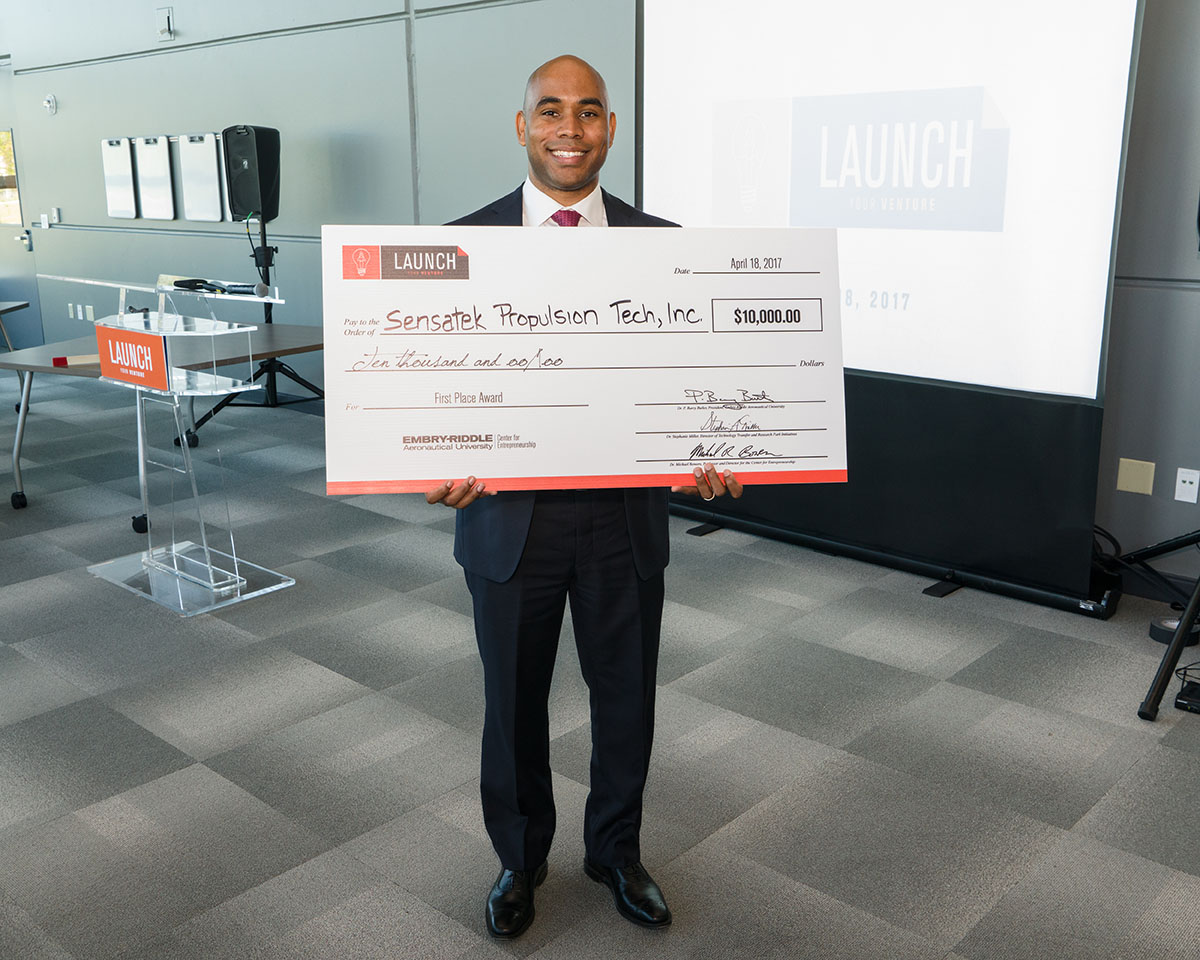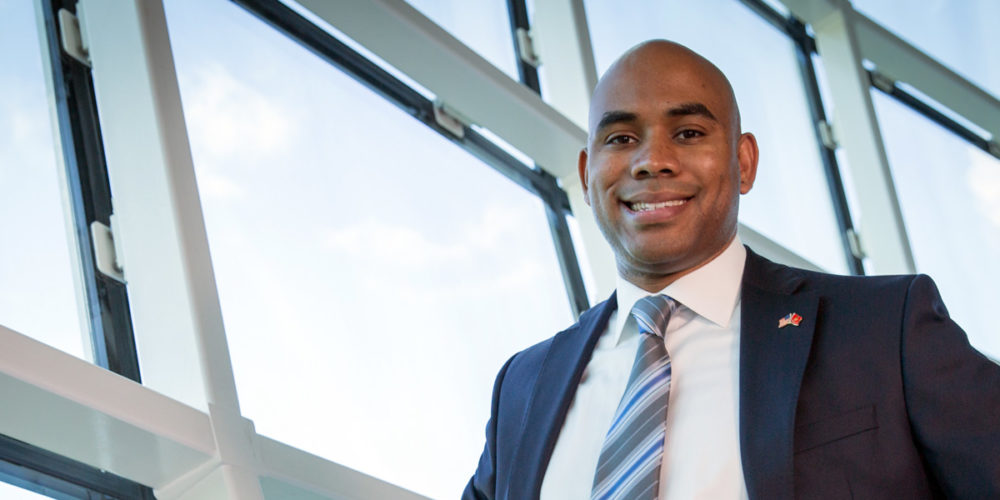Energy and utility companies lose nearly $2 million in unrealized revenue each time a gas turbine engine has a catastrophic failure, and spend $3 million in routine maintenance costs each year to keep those engines turning.
Reamonn Soto believes he has a multi-million dollar cost-saving solution: A wireless engine-monitoring system that can withstand super-hot temperatures and provide direct performance measurements.
A graduate student attending Embry-Riddle’s Worldwide Campus, Soto pitched his idea to a panel of judges and investors on May 19 in Orlando, Fla., and they “bought” it. Soto now holds the distinction of being the first Embry-Riddle student to win the annual Florida Venture Forum’s Statewide Collegiate Business Plan Competition.
The milestone came just weeks after Soto’s business, Sensatek Propulsion, beat out three other student teams to win the $10,000 top prize at Embry-Riddle’s Launch Your Venture competition. Placing first at Launch Your Venture gave Soto the opportunity to compete in the statewide event.
“It truly is an honor to represent Embry-Riddle as a student entrepreneur,” Soto says. “We’ve had so much support and a great team from Riddle that has pushed us along. We now have the eye of the Florida investor community.”
A Win-Win Proposition
His win at the state contest is a win for the university, too, says Michael Bowers, director of the Embry-Riddle Center for Entrepreneurship in Daytona Beach, Fla.
“It’s a milestone for Sensatek and for Embry-Riddle,” Bowers says. “This achievement reflects the hard work and determination of the Sensatek team and the university’s efforts to support and foster innovation and entrepreneurship.”
Sensatek is part of a new generation of technology startups receiving funding and in-kind services at the Embry-Riddle Research Park’s John Mica Engineering and Aerospace Innovation Complex (MicaPlex) in Daytona Beach.
Sensatek will also receive seed funding, mentorship and entrepreneurial support, as part of a joint effort between the university’s research park and the FireSpring Fund. A Central Florida nonprofit organization, FireSpring recently invested $25,000 to help kick-start the business.
By May, Soto had obtained $250,000 in grants, prizes and partnerships for research and for building a commercial-grade prototype of his wireless monitoring sensor.
Keeping His Promise
Manufacturing technology that could potentially revolutionize energy production once seemed like an unlikely prospect for Soto. He struggled with math and science classes in high school. Believing college wasn’t for him, Soto joined the U.S. Marine Corps Reserve. He later enrolled in a trade school to keep a promise that he had made to his mother to continue his education.
“I was raised in a single-parent home. My mom went back to school while raising three kids on her own,” Soto says. “That instilled a value for education in me.”
He leapfrogged from trade school to community college to a bachelor’s degree in physics. Soto says he was initially unable to find work in his field, so he started washing cars. It was then that he got his first entrepreneurial idea: Establish an automotive business to install compressed natural gas kit conversions.
Soto eventually sold the company and leveraged his business skills to work as an economic development financial professional at the Florida Small Business Development Network. He also enrolled at Embry-Riddle, where he’s on track to earn a Master of Science in Aeronautics with an emphasis in aviation and aerospace management.
Energy-Saving Idea
Soto says a new idea sparked in his mind a few years ago when an energy plant’s gas turbine overheated in his neighborhood. While researching solutions to improve detection systems for turbine engines, he says he discovered several patents from universities that he was able to license and use to create the concept for his wireless monitoring device.

In 2015, Soto received a $4,600 grant from Embry-Riddle during a research competition, which paved the way for developing the technology. As part of his research, he conducted more than 240 interviews with industry leaders and representatives. Many of them were Embry-Riddle alumni.
Soto connected with one of those alumni, Jose Rodriguez (’04, ’12, DB), a senior propulsion engineer at Lockheed Martin, through LinkedIn. “I was happy to mentor him and give him guidance about the industry,” Rodriguez says. “Reamonn was polite and eager to learn.”
Soto’s team includes his wife and co-founder, Azryana Soto, and Mark Ricklick, assistant professor of aerospace engineering at Embry-Riddle’s Daytona Beach Campus.
From Prototype to Commerce
As Soto, 31, reaches the next stage of his venture, he will convert his concept from prototype to commercial use. Sensatek recently partnered with Siemens to begin testing the technology at one of its Central Florida facilities. Three Embry-Riddle student volunteers have also joined the Sensatek team.
Soto says the relationship he has with Embry-Riddle has helped propel him forward.
“Our next step is to nail our value proposition and expand our business model and our team,” Soto says. “I think we are just getting started in our relationship with Embry-Riddle, and there will be more opportunities to get students involved in the future.”
